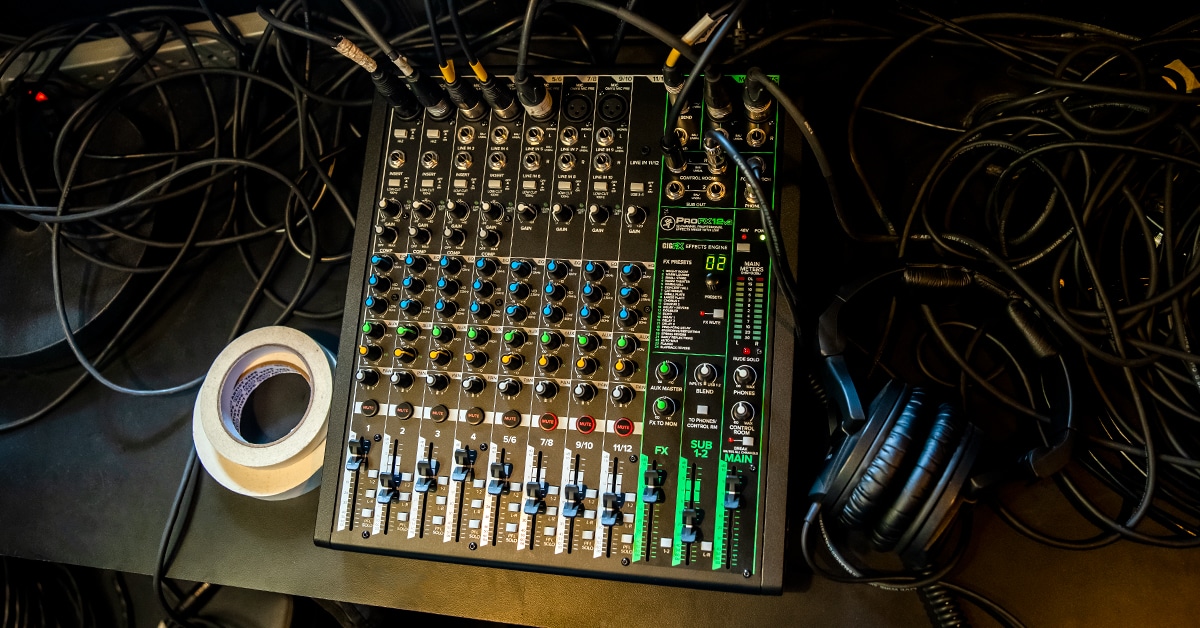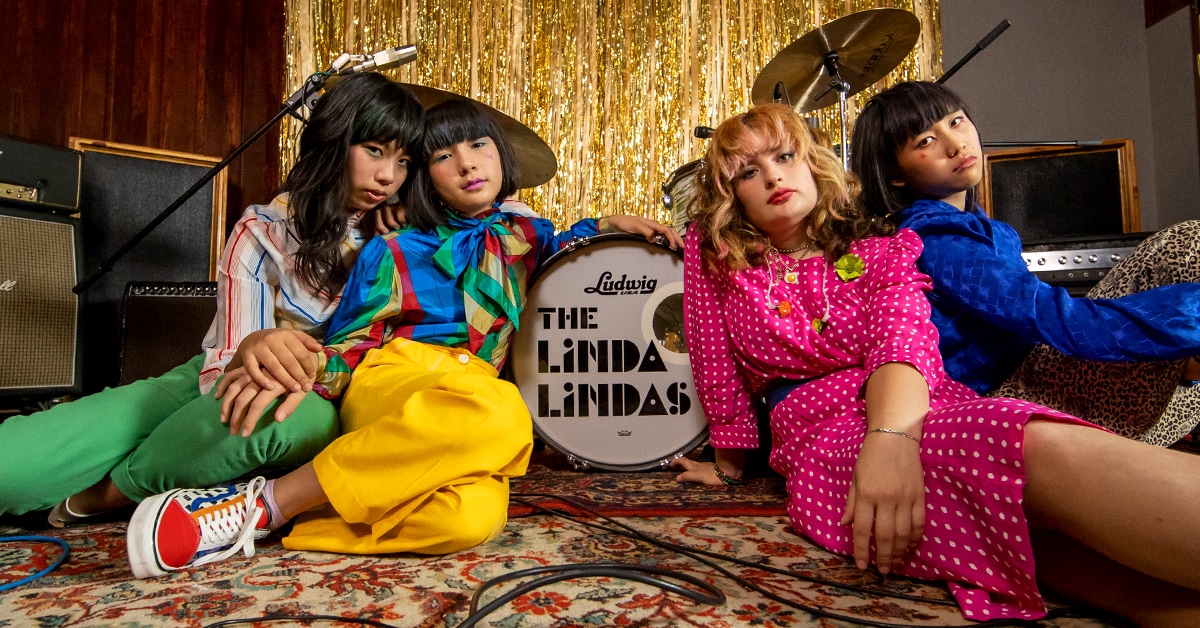Meet The Linda Lindas—the L.A.-based garage-punk band made up of 11-year-old drummer Mila, 13-year-old bassist Eloise, 14-year-old guitarist Lucia and 17-year-old guitarist Bela, who rocketed onto the internet’s radar with the video of their show at the Los Angeles Public Library, featuring their song “Racist, Sexist Boy.” Written after a boy in Mila’s school backed away from her upon learning she was Chinese, “Racist, Sexist Boy” is a blunt, no-holds-barred condemnation of bigotry at any age, made all the more powerful by its source—teen and pre-teen girls using their platform and the power of punk to champion the right to be treated with dignity and respect.
Mentored by such icons as Bob Bruno and Bethany Cosentino of Best Coast, and Kathleen Hanna of Bikini Kill, The Linda Lindas represent an innovative new chapter on the scene. Routinely rotating instruments and the role of lead vocalist, both their covers and original songs always represent a true melding of their four aesthetics and perspectives into one cohesive, punk-driven, joy-fueled sound. We sat down with the four musicians to discuss their journey from first performance to opening for Bikini Kill at the Hollywood Palladium, the collaborative nature of their songwriting process and the community and reach they’ve garnered through their work thus far.
What’s the story behind the band? What sparked you all coming together in this way?
Lucia: Well, Mila and I are sisters, and then Eloise is our cousin. And then Bela we've known since we were tiny, tiny young’uns.
Mila: We kind of had an idea to start a band for a while, because we had grown up around music, and Eloise's dad would put on punk shows for her school's music program, and Lucia and our dad is a producer.
Eloise: Kristin Kontrol [editor’s note: founder and lead singer of the indie rock band Dum Dum Girls] kind of gave us all the opportunity to just go for it.
Lucia: She invited us to play a little show with some other kids.
Eloise: From this project called Girlschool.
Mila: And that was the first time the four of us played together onstage.
Lucia: I had a broken arm. Eloise and I were playing keyboards.
Mila: I was playing just a snare drum.
Eloise: And tambo.
Mila: And the shaker. We still have that tambourine. It's so broken.
Bela: It has tape all over it.
Eloise: Only one of the jingles works.
Lucia: Anyway, that was the first time we played all together. But that's what started it.
Eloise: We got to play with Bethany and Bob from Best Coast, and we also got to play with Karen O.
Bela: I met Carrie Brownstein that day, which was cool.
Lucia: So that just was an awesome day for us. The show started at, what, 11:30?
Mila: It was so late.
Lucia: But we did it.
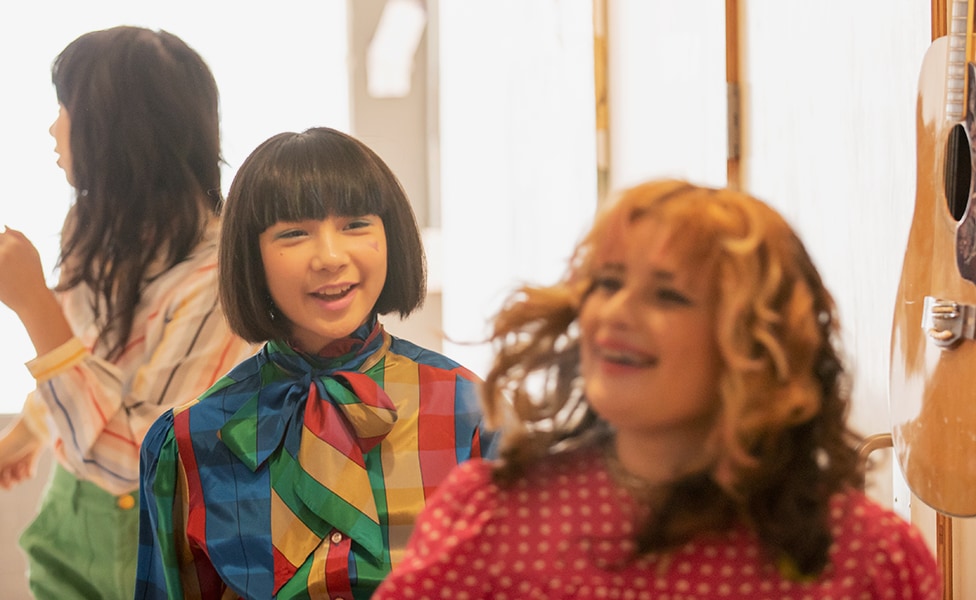
Mila: The summer after, Bela invited us to play a show at the Hi-Hat together, and we didn’t even have a name, because it was her show, and she invited us to do it with her, so we were called Bela and Friends.
Lucia: We just played two songs. We were a cover band.
Mila: We played "Our Lips Are Sealed" and "Manic Monday." In that one, I had a broken thumb.
Lucia: She played one-handed. That's how we started, and we kind of got into it a little slowly. First, we did very easy songs.
Mila: At least simplified versions of songs that we liked.
Eloise: We didn’t entirely know how to play our instruments, except for Bela who had played guitar for three years prior to when we started the band. We played a bunch of the benefit concerts that my parents put on for my school's music program, Save Music in Chinatown, and we kind of learned and grew from there. And then we played another benefit concert for Jackie Goldberg for the schoolboard. And so that one, somehow, Kathleen Hanna got a video of it.
Mila: Because we played a cover of "Rebel Girl" by Bikini Kill, and she saw it, and invited us to play at the Palladium with Bikini Kill. It was so awesome.
Bela: That was our first real show.
Mila: Yeah. I mean who does that? Who sees a video of young girls playing a cover of their song and invites them to play at the Palladium?
Lucia: That's the biggest show we've ever done.
Bela: We surprisingly did okay. We could've been trash, and she was taking a chance.
Lucia: When we were practicing every day in the weeks before that, it was kind of like—wow, I think we might pull this off.
Mila: Yeah. The band was so nice, and Kathleen has always been really awesome to us.
Bela: She's been super supportive.
Lucia: And it was at the show that Amy Poehler was there.
Mila: And then she invited us to be in her movie, Moxie.
Lucia: That is when we first recorded two songs here in this studio. "Rebel Girl" by Bikini Kill and "Big Mouth" by The Muffs. And that was the first time we ever recorded anything.
Bela: Yeah. It's fun to be back. Full-circle moment.
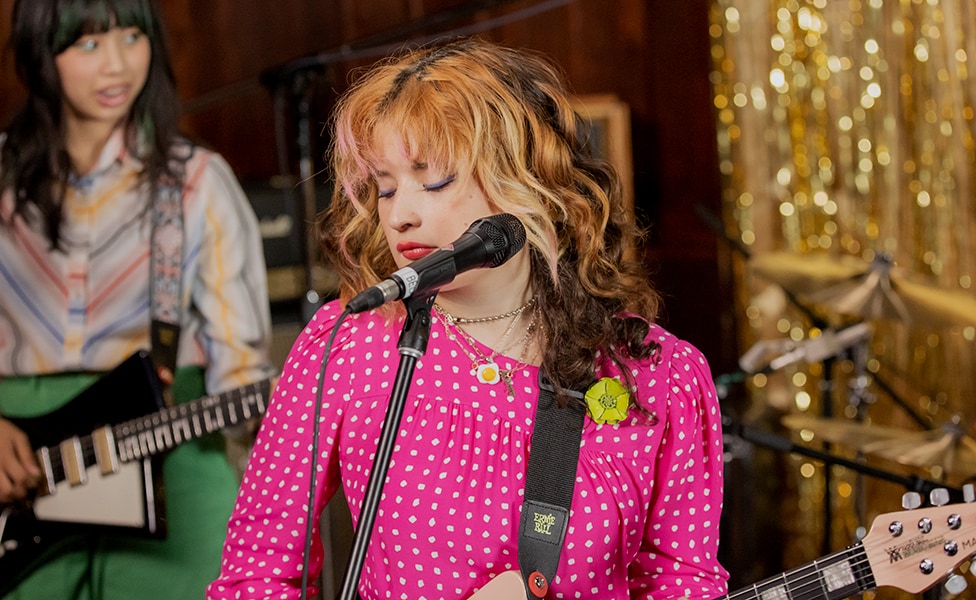
What was the moment when you first realized you really had something as a group?
Bela: The Palladium was one thing that really pushed us. We needed to crack down. From there, everything kind of started coming real fast, so we just had to nail it. I think that was the first time we really practiced every day.
Eloise: I think, for me, [it was] one of our first shows in Chinatown we played. It's like a really small venue, but when we played, people really responded. And it wasn't just people that we knew. It was other people, too. Also, at the end of that, Alice Bag and Phranc, they were cheering for an encore, and we're all like, “What?” We didn't have any songs to play, so we played “Love Will Tear Us Apart.”
Lucia: I think that was the moment that I was like—oh, we've done something. And that was so fun, and we liked doing that, and we're gonna try to get somewhere now.
What is your favorite part about making music as a band together?
Mila: You always have someone there to encourage you. It's fun and cool that you're not alone in making music. And also you get to hang out with people you love, and it's cool that we get to do that.
Lucia: Just having something to look forward to doing after school, getting inspiration and going home and being like, “I have an idea. We should do this.” And they'll be like, “Yeah, let's do it.” That's just kind of a cool thing to know there are these people with you, and we're all following our dreams together.
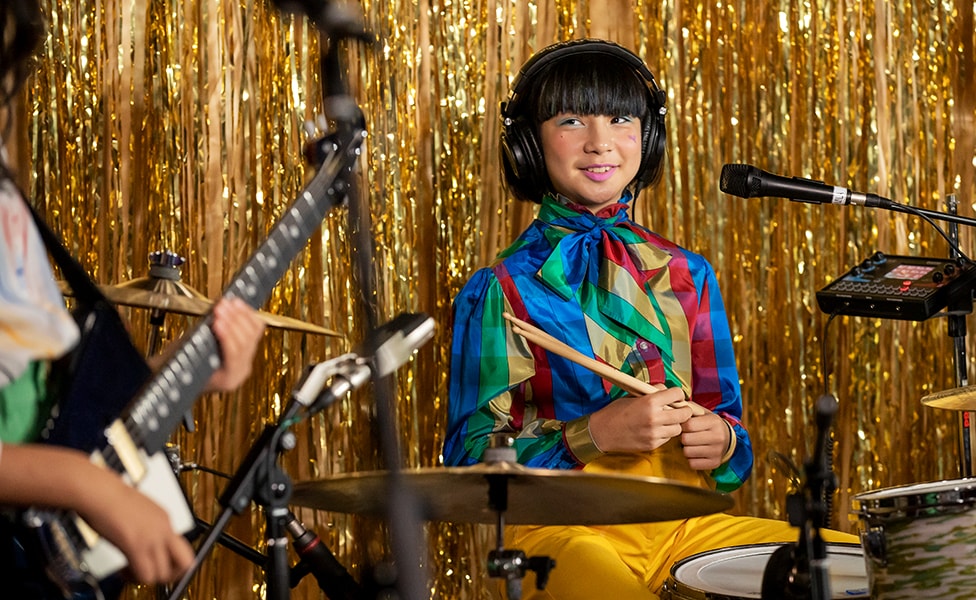
What drew each of you to the instruments that you play?
Mila: I was eight-ish when we started the band. My hands were small, and I couldn’t play guitars or bass, so I played drums.
Lucia: We were like, "Mimi, get on the drums." And she did. She's good at it.
Mila: Drums are very fun.
Bela: I feel like it fits Mimi very well, being a drummer. I think it's so cool because Mimi is the youngest one of all of us, and she's the one basically leading us because she's the drummer, and we have to follow her. So, she's the boss. I had already played guitar when we formed the band. I started playing classical guitar because I was really into flamenco and Latin music, and it was kind of something I always wanted to do.
Lucia: I think I started playing guitar because I already had a guitar. It was a small—it was called a Duo-Sonic. I had kind of messed around with it before, but not really, and then we started the band, and it was like, “Time to get to work.”
Eloise: For me, I didn’t make it to the first practice, and so the only instrument left was bass, so I played the bass. But yeah, bass is cool. It's funny, because I have a really high voice, but I get to play low bass.
Lucia: We've all grown into them a little bit. But we also still love switching around sometimes.
What is your process for making music? How do your individual aesthetics contribute to your group sound?
Bela: We each bring something different to the table. Eloise has this scream, like, classic punk, which is awesome, right? And then, Lucia and Mimi have their sing-y harmony—like, Lucia loves harmonies and pop punk, kind of thing. And then mine is like a weird—I don't know. I talk when I sing, kind of thing. But it all works together, and then we can all mix different things into our songs. I'm able to mix in our culture, because we're gonna start having songs in Spanish and different things like that. We're mixing in stuff from our lives into our music.
Lucia: We all listen to different music. We all come up with different ways of writing music. We all sing in different styles. I don't know. But it works. It's kind of cool.
Mila: All our styles kind of, like, fit together in a weird, awesome way.
Lucia: We started song writing separately, and that's how we learned. I think we're kind of relearning how to songwrite together. During practices, we try to find time to create our sound, because we're kind of still discovering what that is. We know who we want to be and kind of what we want to do-ish, but our sound we think will change over time.
Bela: It's very broad right now, which is cool, because we can do anything really with our songs.
Lucia: And we're discovering how we want that to happen. And it's happening right now.
Mila: There's so much happening and there's so much to write about. So, you can kind of take inspiration from anywhere. Plus, it's easier to write songs together because we can each—
Lucia: Bounce off each other.
Mila: If we ever do get writer's block, we can be like, “Hey, I have this lyric, but I need help with writing this,” or, “Hey, what about this melody? Do you think we could go with this?” Stuff like that. The first song we actually wrote together—it was Claudia Kishi, but then that was the only song we wrote for a while, because we were kind of still getting the hang of it.
Lucia: In the middle of band practice, just in between songs, Bela will start doing some cool thing, and I'll be like, "Do that again." And then she'll do it again, and then we'll all add onto that. But bringing in a song originally can be rough. You can bring it in, and you can be like, “I really need help with this.”
Mila: And sometimes, it's scary to bring songs to other people.
Lucia: I think songwriting is a real self-discovery process. I think there's a lot of thought and care that you put into a song, and when you see how it turns out and how you can share that song with other people, that says a lot about you. We all have different strong suits, and we're all kind of finding that asking each other for help when we're songwriting is also—it's kind of a thing where, yes, I have a person that will kind of guide me to what I want to do, and that helps us get to know each other more, and that helps us to get to know ourselves more in that. If the first time you bring a song into the world is with your friends, then that makes bringing it to the rest of the world so much easier.
Eloise: And so much more fun.
After you start with the lyrics or part of the melody, what is the process for building out the rest of the song?
Mila: "Oh!" was one of the first songs we wrote together.
Bela: I brought in the riff. We were outside on their porch, so I just played it to them, and Eloise wrote the lyrics that day.
Eloise: I was frustrated about a situation at school where I was trying to help a friend who was being picked on, and it didn’t really work. The day that we got out of school, we all recorded in a studio in their backyard.
Mila: We all came up with the chorus for "Oh!" together.
Lucia: Originally, the bass walk-down thing was going to be a breakdown type thing, where we all stop, and it's just the bass and the drums. And then we scratched that. We turned it into the chorus and we wrote some lyrics for it. That was such a learning process. That song's very special to us.
Your performance of “Racist, Sexist Boy” really connected with people. Can you talk about why that is, as well as some of the responses to the video?
Lucia: It's funny because—it wasn't that complicated of a song, but it's really powerful, and that's what resonated. Our energy, and the lyrics, and message and story behind it.
Eloise: But I think what was cool about that was—it's not cool, but a bunch of people could relate to it.
Lucia: There's this community now.
Bela: I think [“Racist, Sexist Boy”] was a healthy way for Mimi to express what was going on in her life at that time, and she didn’t choose to, I don't know, punch the guy in the face. She was like, "I'm gonna write a song, and I'm gonna handle this in this safe way."
Mila: And I'm gonna help spread the message to other people and help stop it.
Lucia: It's a very heavy song, and so listening to it—mostly because it doesn’t make you feel heavy, I don't think. It's more empowering than that.
Mila: Yeah. It could make you feel lighter because you know that other people are there.
Eloise: I think it's cool because it started out as an angry song, because we were, like, really upset about the guy in Mimi's school, or the person that made the racist comment to Mimi, but it kind of turned into something empowering.
Lucia: I think that we can rise above it, and that there's so many people that felt like it mattered to them, and that makes it matter even more to us.
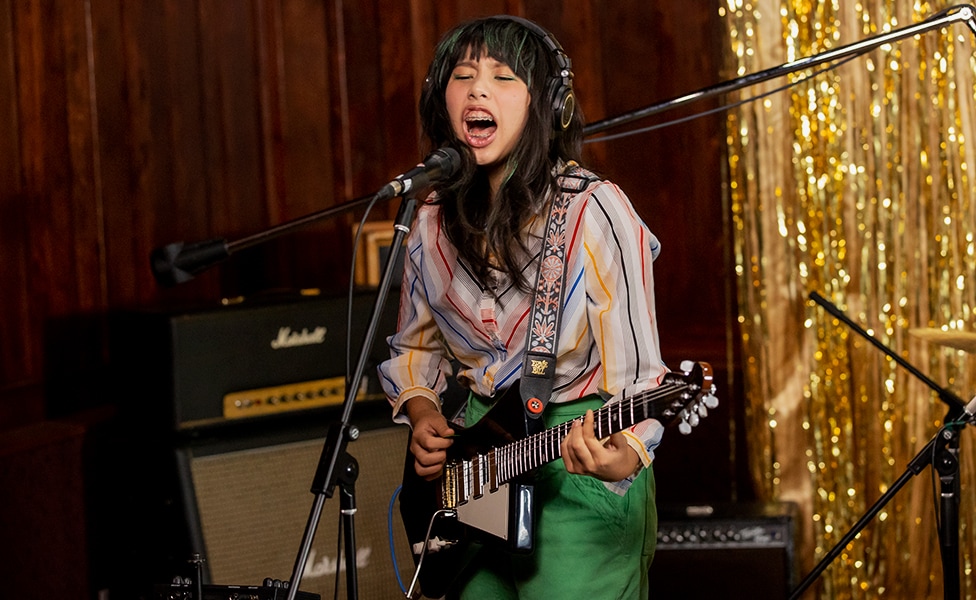
What are some of the reactions you’ve received to your music?
Lucia: I think it's cool that we have people reaching out to us from Japan, from Australia, or from Brazil, or from Germany, I don't know. Mexico. That there are people out there that see us—and we hope people know that we see them. We see them when they tag us on Instagram or when they make fan art of us.
Bela: Yeah. We love the fan art a lot.
Lucia: Or when they send us emails, or messages about how they came across our music.
How have mentors played a role in your development as musicians and as a band?
Mila: We have a lot of mentors and people in music that have helped us. Some of those people are Bethany and Bob from Best Coast, Kathleen Hanna—
Lucia: Bethany has gone to pretty much all of our shows.
Bela: Bob was our guitar tech. He doesn’t have to do that, but it’s so cool that he's willing to help us along the way.
Mila: Kathleen has just been really supportive of us, and she gave us a chance at the beginning, like we said.
Lucia: She fought for us to be in Moxie.
Mila: Because at first, they were like, "Oh, they're too young for this movie," but she fought for it because she knew. She believed in us.
Lucia: And that made us believe in ourselves a little bit more too. Phranc, too.
Eloise: Yeah. She's always supported us and has helped me develop songs and stuff.
Mila: And during the pandemic, you guys FaceTimed, like, once a week, right?
Eloise: Yeah.
Lucia: We've had a lot of people looking out for us, and we're so grateful for that.
Eloise: Also, Uncle Carlos. He showed us how to play our instruments and produces our music.
Lucia: But we support each other too. Support. Friendship.
How does music unite everybody? How does music bring us together?
Lucia: There's a certain sense that it's for everyone. It's created by everyone. More and more, you can see everyone is being represented in music, although there's still a long way to go. But even at The Smell show that we did a little bit ago, there were little babies there, and there were also older people on walkers, and it was just cool that there's this connection that brings everyone together.
Bela: Even if there's a language barrier, there's always one song that everybody knows, and you can sing it together, or you can just hum the sound of the song, right? You don't necessarily need to know the lyrics.
Mila: Yeah. It's cool that music reaches so many people.
Eloise: I think that, for me at least, music is something that I do with people I love. It kind of brings me together with, I don't know, my cousins, and our friend, and just as a band, we're together.
Lucia: It’s everywhere, and everyone has had an experience with music. Maybe when they were little, maybe when they were older, but it's something that shapes us and grows with us. We grow closer when we make it together, when we write it together, when we learn it together. Because when you write a song and you share it with someone, that's sharing a little piece of yourself. And we've done that so many times, and we know each other so well, that it's connected us in that way.
Any advice to people who want to start a band?
Eloise: Just go for it, and don't worry about not being perfect. Don't worry about people not liking it. Just go for it. Do it with people you love. Do it and talk about things that matter to you. And make music that's important to you.
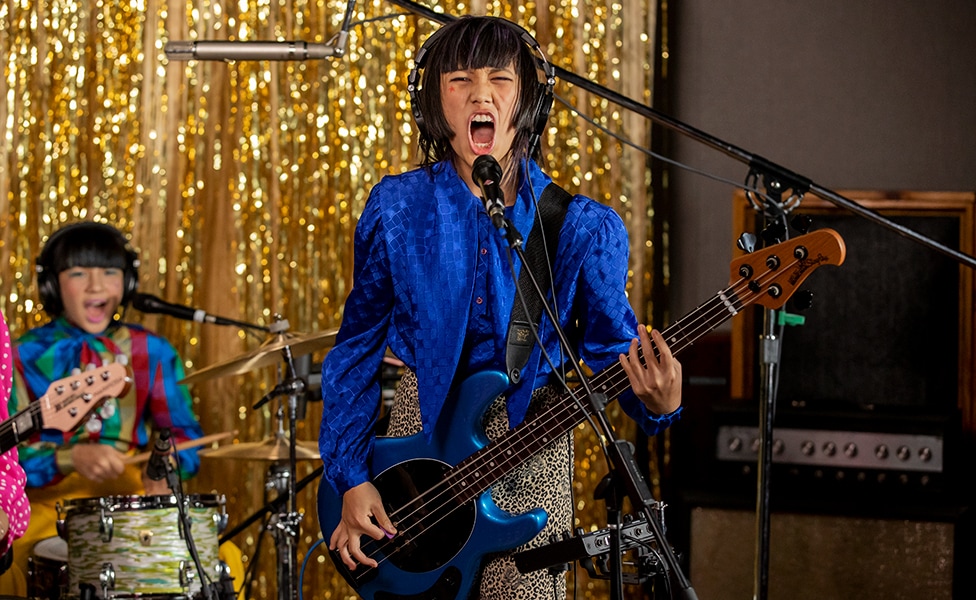
Keep up with The Linda Lindas.
.jpeg)





